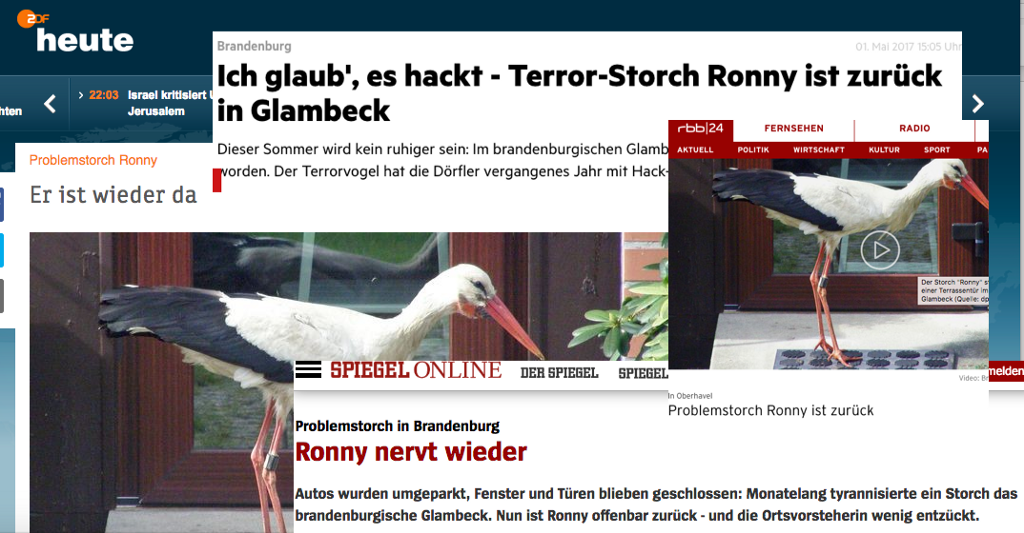This Maniac Stork Won't Stop Terrorizing a Tiny German Village
Deutschland über us.
Germany’s headlines are going cuckoo for Ronny the Stork.

Every news outlet in the Federal Republic is hot on the biggest scoop of the season: Ronny, a ginormous fowl with an apparent vendetta, has alighted upon the tiny village of Glambeck — not with a newborn baby in tow, but rather bearing a violent grudge against car roofs and windows, which he wails on “as if possessed.” No shiny surface in the 130-person Dörfchen (DOEEEERF-schen; a very small village) is safe from the “Terror-Stork” and his Schnabel-Attacken (SHNAH-bull ah-TACK-uhn, or “beak attacks”).
You must watch this video right now. I’ll wait.
Gehen die Hackattacken wieder los?: Krawallstorch Ronny ist zurück in Glambeck
As the wall–to–wall coverage makes clear, this isn’t the first time the Problemstorch (pro-BLAYM-storsh) has wrought hack-attack havoc in this particular hamlet. “The village tyrant is back!” alerts Hannover’s local; “Not him again,” begins the German wire service story that’s stoked what appears to be a nationwide Ronny Fever.
Well, according to a hard-hitting report on Germany’s answer to CNN, N-TV, Ronny’s unrelenting onslaught of Schnabel-based automotive murder is an unfortunate case of mistaken identity. After his First Beak Contact last summer, conservationists attributed Glambeck’s unprecedented rise in stork-on-reflective-inanimate-object crime to “exaggerated courtship behavior”: Ronny had been incensed that another pair of storks had settled in the village and built a nest. So, first he attacked the happy couple’s home, which was atop the village church’s chimney (of course it was). Then, later, when he looked at windowpanes or shiny black-painted cars, he saw his reflection — and obviously mistook it for a competitor. Now he’s back, and he’s still pissed.
Just as this isn’t Ronny’s first time at the Hackattacken rodeo, it’s also not the first time in recent years an animal’s unusual behavior has captured the hearts of a people who normally fortify that organ against capture with tight shirts and pedantry. Who can forget Knut (RIP), the polar bear cub abandoned by his mother but adopted en masse by the entire city of Berlin? And then of course there was Paul (also RIP), the clairvoyant octopus who could predict the winners of sporting events.

For as much as Germans regard other humanoids with skepticism (on a good day), they love the shit out of their animals. The term for loving animals is, in fact, to have ein Herz für Tiere (ayn HAIRts fooooooer TEE-ruh), or “a heart for animals,” something I learned the hard way on a visit to Berlin in 2005, when the underground public transport stations of the world were at Peak Charity-Mugger, in the days before omnipresent phone-gazing and earbuds mercifully eroded that particular epidemic.
I lived in New York at the time, where I couldn’t swing a half-dead rat in the vicinity of a subway station without some perky twentysomething blonde up in my face asking me if I had Time For The Children. I’d fled to Berlin for a month to re-learn the language of German (I’d just been accepted into a PhD program in German Studies, and they were under the impression that I spoke it), and also to get away from the guy who’d just dumped me and the city that reminded me of that fact, only to alight at the U-Bahn station of the Ku’Damm — the Times Square of Berlin, which was at the time home to the city’s biggest and best internet café — and have some perky twentysomething Aryan up in my grill asking me if I had ein Herz für Tiere.
When I told him nein, meaning Nein, I do not have time or desire to give my credit card number to a fake charity on the street, he started. “You don’t have a heart for animals?” he asked, on the verge of tears. You ever have one of those situations where you accidentally say the wrong thing but it would be so time-consuming to correct it — especially when your ultimate goal of being left the hell alone is in peril? Obviously, I had no choice but to stick with my lie. “Yes,” I said. “I hate animals.” Everyone around me gasped, and a few even followed me onto the U-Bahn platform just so that they could look at me with mild disapproval.

Even though Germans enjoy eating all manner of animals — some of which are barely even dead — to say that you don’t love animals to a German is akin to saying you don’t love white asparagus, or that you don’t care about the difference between Saxony and Lower Saxony (whoops). Germans love animals so much that the Berlin police recently held the German public rapt as they spent a night in a daring rescue of a hamster named Sir Henry.
And although Germans have a heart for all manner of fauna, they grant the canine genre an especially lofty status. Although dogs are also omnipresent Stateside, they are generally relegated to our private residences, wide open spaces and select “dog parks,” which is American English for feces sculpture gardens.
Americans will often try to skirt the general Hundeverbot (HOON-duh-fer-BOAT) in public accommodations by claiming their yappy little nightmares are “therapy dogs” (I see you, obnoxious yentas in that one café upstate last summer — what was that Cujo “therapy” for, restaurants that are insufficiently terrorized?). Germans and Austrians don’t have to do this (they wouldn’t anyway; it’s against the rules), because dogs are welcome in all manner of public place so long as they are wearing a leash and muzzle, or, as Germans call it, a Beißkorb (BYE-skorb, literally a “bite cone”).
Thanks, then, to Germans’ incorrigible Heart for Animals, the good old ’Murcan remedy for Ronny the Problem Stork (HINT: I MEAN SHOOTING HIM) is not an option. He’s just going to keep challenging his reflection to a duel, and the 130 poor souls in Glambeck are just going to have to keep hanging sheets over their windows and moving their cars. Eventually, like all other affectionately named and unofficially adopted German wildlife, Ronny will someday hack-attack off this mortal coil, hopefully after a long and happy life of beating the everloving shit out everything shiny. Until then, the Germans will count the days until the end of August, when Ronny migrates to the south and becomes somebody else’s Problemstorch.
